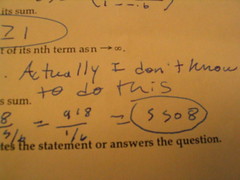 Image via Wikipedia
Image via Wikipedia
I wonder whether tacit knowledge might help with the perennial debate about the existence of God? Although atheists sometimes concede God's existence is not in principle provable, my usual experience, especially online, is a demand for proof.
Crawford, in his book The case for working with your hands, tells the story of his father, who was a physicist, making the claim that it is possible to untie a double knotted shoelace by pulling on one end. Mathematically this is true, or so Crawford claims. The point is though in real life, you cannot untie a double knotted shoelace in this way. The problem is the physical properties of the lace have a bearing on what can be done with it. Whilst mathematically it might be possible, physically it is impossible because shoelaces are made of something.
So, let us assume I have a proof of God's existence. How do I know it is in fact a proof? The rules that determine a scientific proof demand we strip a problem down to its basics, ignoring the realities we encounter when things are apprehended in our lives rather than through our heads.
This claim that only formal proofs are valid, gives away the reality of the radical atheist's position. It is in essence a requirement for control. It is not a free encounter with reality but one that is determined by prior ideological constraints. It is an assertion of imperialism over and against the radical call to freedom. We are told to sacrifice what we experience as true, to a particular partial understanding of our world. The point is formal knowledge alone is not sufficient to make a chair or mend a motorbike, lat alone encounter God.
But there is a sense in which radical atheists are right. if you really want proof of God, you need to do what the scientist does. Scientific proof requires many hours in the lab, applied to getting experiments to work, in the sense of providing reliable results. Usually this requires the application of significant technical expertise. Without this dedication we would have no science whatsoever.
What I find difficult to understand is that anyone who wants proof of God, needs to apply themselves to it, in just the same way as the scientist applies herself in the lab. It's all very well demanding proof but a little odd to condemn those who claim to be believers as having no proof, when you are unwilling to do what is necessary to find out for yourself.












Recent Comments